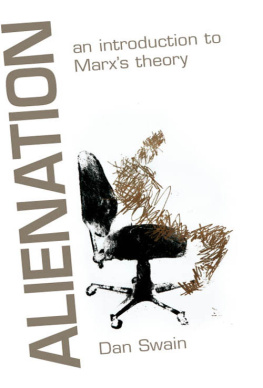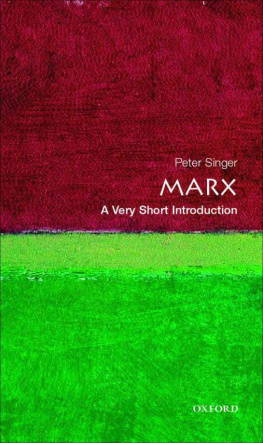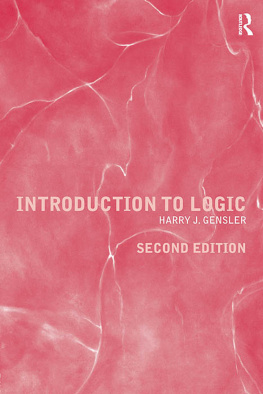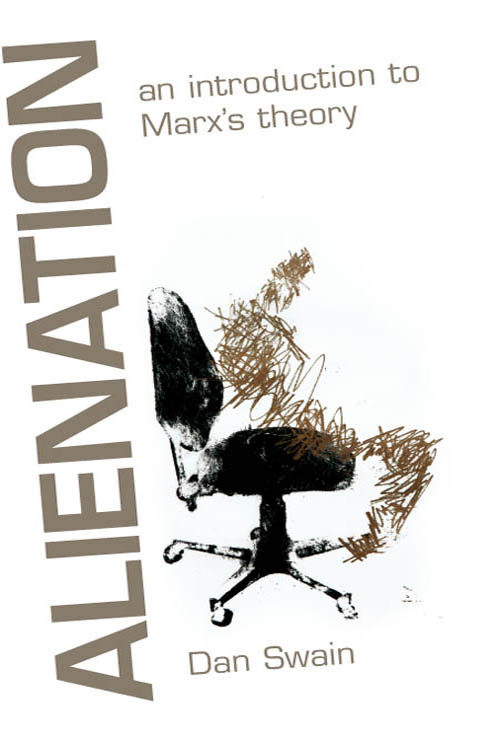Alienation:
An Introduction to Marxs Theory
Dan Swain
About the author
Dan Swain is a postgraduate researcher in philosophy at the University of Essex. He is on the editorial board of International Socialism, a quarterly journal of socialist theory.
Alienation:
An Introduction to Marxs Theory
Dan Swain
Alienation: An Introduction to Marxs Theory
Dan Swain
First published in January 2012 by Bookmarks Publications
c/o 1 Bloomsbury Street, London WC1B 3QE
Bookmarks Publications
Cover designed by Esther Neslen
Typeset by Bookmarks Publications
Printed by Russell Press
ISBN 978 1 9051 9299 2
Contents
Acknowledgements
Some of the content for this book is based on my MA dissertation which was completed at the University of Essex and was supervised by Fabian Freyenhagen, who also offered helpful comments on an early draft. Joseph Choonara and Paul Blackledge gave me extremely helpful comments, which I hope I have done some justice to. Thanks also to Sally Campbell at Bookmarks for help throughout the process. Finally, thank you to Julita Skotarska.
Introduction
Let me right at the outset define what I mean by alienation. It is the cry of men who feel themselves the victims of blind economic forces beyond their control. Its the frustration of ordinary people excluded from the processes of decision-making. The feeling of despair and hopelessness that pervades people who feel with justification that they have no real say in shaping or determining their own destinies.
These are the words of Jimmy Reid, the Clydeside trade unionist, after being elected Rector of Glasgow University. In this speech he described and condemned the lived experience of millions of people, and indicated that alienation is much more than just a philosophical concept: Many may not have rationalised it, may not even understand, may not be able to articulate it. But they feel it.
The young German radical Karl Marx began to diagnose this condition of alienation in the early 1840s, and remained preoccupied with it throughout his life. The theory of alienation he developed described how our human activity could come to be experienced as something external, alien and hostile to us, and the negative effects that could have for our body and mind. Marx saw this experience of alienation not as an inevitable part of the human condition, but as connected to particular ways of organising human activity. The kind of alienation he described was a consequence of an economic system which was then in its infancy, but now dominates the globe: capitalism.
The riots showed the continuing relevance of Marxs ideas about alienation. The howl of rage from people who feel they have no control and no future was visible for anyone who wanted to look.
One of the most striking stories during the riots was an interview conducted by a BBC journalist with two young women. The BBC, typically, sought to portray them as criminal, feral and ignorant, and presented them with a slightly mocking tone. However, listening to the words they said revealed a deep social alienation. When asked why they were rioting they said:
Its the governments faultthe Conservatives Its not even a riot, were just showing the police we can do what we want, and now we have Its the rich people, the people who have got businesses, and thats why all of this has happened, because of the rich people. Its about showing the rich people we do what we want.
For these women, and hundreds of thousands like them, brief moments of challenging the police and the rich are the closest to exerting control over their lives they are likely to get. The great tragedy of these words is that these women cannot do what they want. They are constrained by unemployment, deprivation and poverty, as well as police harassment and racism.
The purpose of this book is to offer an introduction to Marxs theory of alienation, its origins and its continued relevance. As long as we still live under the system Marx analysed, Marx remains relevant. Its worth noting, however, that to refer to a theory of alienation in Marx can be a little misleading. Marx does not offer a clear, unambiguous definition of what he means by alienation. Instead we find a theme running through Marxs work which involves describing and diagnosing the connections between the system of capitalist production and the profound social, physical and mental ills that it creates (though even the argument that there is this continuity is controversial, as I will point out in a later chapter). Underlying this is the sense of a system out of control and of our own activity experienced as hostile to us. This, in the broadest sense, is what is meant by alienation.
There is a difficulty in writing about alienation in Marx. For Marx alienation was a complicated phenomenon which permeates every aspect of human life. It has to be examined from a number of different sides and in a number of different ways. Thus, while it is possible to talk about alienation from labour and alienation from others, these are often overlapping and interconnected. It is not easy to chop things into pieces and say, This is an example of alienation from self; that is a result of alienation from others. So, while this book is divided into chapters on different aspects of alienation, I have also tried to emphasise how interconnected each of these aspects are.
The key thing to remember about Marxs theory of alienation is that it is the concept by which he linked a variety of different social phenomena to show their roots in the capitalist system. As Bertell Ollman puts it, Alienation is the intellectual construct in which Marx displays the devastating to be genuinely radical is to try to understand the causes of the ills of our world, so that we can uproot them, and abolish them forever.
Chapter 1
Alienation and Enlightenment
Marx did not develop his ideas about alienation in a vacuum. They have their roots in much of the political and philosophical debate of the Enlightenment and the years that followed it. This was a time characterised by increasing attempts to challenge the divine rule of kings, and pose the question of how society might be organised differently. This period saw a growing capitalist class rebelling against the backward, aristocratic feudalism which restricted their rights and, just as importantly, their ability to make profit. Radical philosophers and thinkers began to examine questions of political legitimacy: when is it legitimate for some people to rule over others?
A crucial part of this was the growth of what would now be called the social sciences, albeit in a far cruder form than what exists today. Broadly, the idea was that in order to determine the way in which human societies ought to be organised they had to understand human nature, and to examine the basic laws governing human behaviour. Human beings ought to, if possible, live according to their nature. If living according to their nature was impossible, then certain constraints could be enforced. For example, the 17th century English political theorist Robert Filmer used these kinds of arguments to justify the rule of kings, arguing that this was simply a re-creation of the natural authority of fatherhood, and that kings were the descendants of Adam, the first father. His contemporary Thomas Hobbes argued that peoples naturally hostile and competitive nature required the authority of a strong and ultimately all-powerful monarch for protection. For others in the Enlightenment, however, these arguments were increasingly turned to more radical conclusions.











